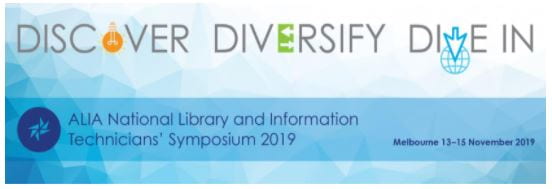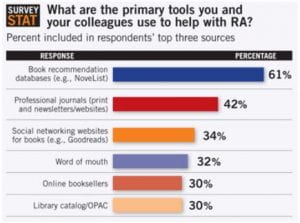Summary
Content – Library Technician Symposium
Type – Symposium
Length – 14 Hours (2 days) + 1 day library tours
Level – Library Technicians, Librarians
Organisers – ALIA
Presenters – Various
Format – Keynote address (each morning) followed by small breakout workshops
Reflection
The symposium’s main focus was to provide an opportunity for library technicians from around Australia to come together to listen to prominent members of the profession, their peers, speak and debate issues that have arisen in the library technician field. It enabled people to network and connect with like minded individuals through informal and formal events that were planned by ALIA.
One of the reasons I wanted to attend the conference was that as I work within a school library I am the only library technician and it is very difficult to connect with others at my level. I had been working as a library tech for 5 and a half years and apart from connecting with others via social media I thought it would be a great step in my professional development. Another drawcard was that when I looked at the program there were a lot of opportunities to learn and develop new skills that I can use now and later in my career.
Day 1
On the first day there were a number of library tours that we could attend to see how different library environments worked. My first visit was to the Melbourne City Library to gain an insight to how their main public library branch worked. I have no experience in this field and it was interesting to see how not only is it a library but upstairs there is also a viewing space where local artists can display their work. As libraries are community spaces it was nice to see that the library was also respecting what the community values with a strong emphasis on art and collaboration.
My second visit was to the Melbourne Cricket Club library situated within the MCG. As this is a specialised sports library focusing mainly on cricket, it does house information about other sports across Australia also. Not only does it run as a library but it also doubles as an archive as was first established in 1873. It is open to the members of the MCG when there is a game being played and a number of researchers from across the world have used the information it houses.
Day 2
The first official day of the symposium was opened with a keynote address by CSU own Dr Mary Carroll who spoke about how the library technician job is today as valuable as it was back when the position was first established. Next we heard from other library techs and their experiences in their libraries, ranging from TAFE libraries to what it was like working within the National Library.
Breakout Session 1 – Twitter
The first breakout session I attended was on the value of Twitter as a tool for establishing and expanding my professional learning network. Margie spoke of the importance of making positive connections on the platform and connecting with people from all library worlds to gain exposure to their thoughts and ideas on certain issues. I think that Twitter is such a valuable resource for information professionals as it is a place that is continually updating and you can learn so much from a simple 5 minutes looking at a feed.
Breakout Session 2 – Video Strategy
The second session hosted by Jade Koekoe was all about how you can make videos that have a strong purpose and people will gain something from them. In this day and age it is vital that libraries are utilizing every platform they can to help inform their clients. Jade spoke about how to edit a video to ensure it is engaging and informative for the viewer. Now more than ever having a strong presence online comes down to how well libraries can make themselves known.
Day 3
The final day was opened with another keynote presentation by Maddy Medlycott and Michael Hawks who spoke about how we as library technicians need to be confident in our skills and the value we bring to libraries.
Breakout Session 3 – Canva
Hosted by Jade Koekoe this session was about how creating enticing graphics for the library’s social media page is as simple as having 3-4 elements on an image. Promoting events or new products in the library so people come into the library happen mostly on Facebook/Twitter/Instagram. Thinking about the images I have made for my library I learned that I could have done things differently to enhance the design to convey my message clearer.
Breakout Session 4 – Escape Rooms
The final breakout session I attended was learning how Nikki Imberger planned a Harry potter escape room within her public library with little to no budget. Nikki took us through how she planned, promoted and built her escape room with simple props and tools she already had within the library and some she hand made. Listening to her experience gave me a view on how I could run one within my library context.
I really loved going to this symposium as I was able to connect with others on my level and some who were also extending their education and gaining their Bachelor degree. It was valuable as I was able to connect with people and make professional connections as well as develop my skills further with the sessions I attend. I think that skills that I gained made me think about how I can use social media to positively promote the library.
Evidence
Tax Invoice – ALIA National Library and Information Technicians’ Symposium 2019


